WATCH: ‘Prisoners coming out of jail more addicted than when they went in’ says campaigner as News Letter reveals sheer extent of drug death boom
and live on Freeview channel 276
Gary McMichael, the CEO of ASCERT, also suggested that health staff are over-prescribing certain drugs, since legal medicines now account for such a big slab of the Province’s total drug fatalities.
He made the remarks to the News Letter yesterday, after the paper had analysed a stack of statistics showing that deaths linked to narcotics have skyrocketed over the last decade.
Advertisement
Hide AdAdvertisement
Hide AdThe News Letter came across the drug statistics in this report while searching for data on how substance abuse has changed during lockdown.
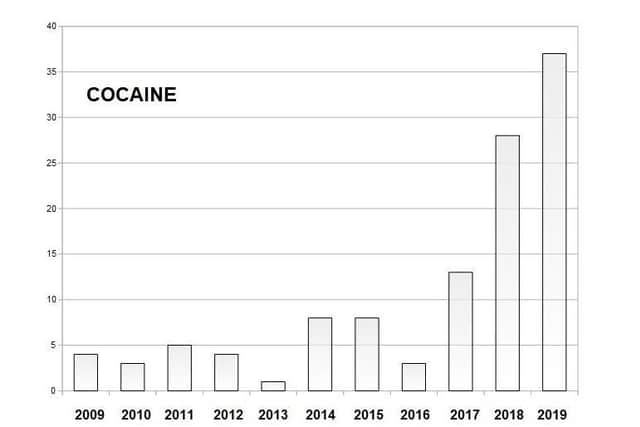

Though the number of drug fatalities in 2020 will not be published until next month, Mr McMichael already believes he knows what is in store.
The “stress and strain experienced within families” during lockdown is likely to translate into worse substance abuse, he said.
“It think that’s the direction of travel. We’re likely to see it continue to increase.
Advertisement
Hide AdAdvertisement
Hide Ad“Overall you have greater availability of drugs within the community, and in particular opiate-type drugs which are among the most dangerous.”
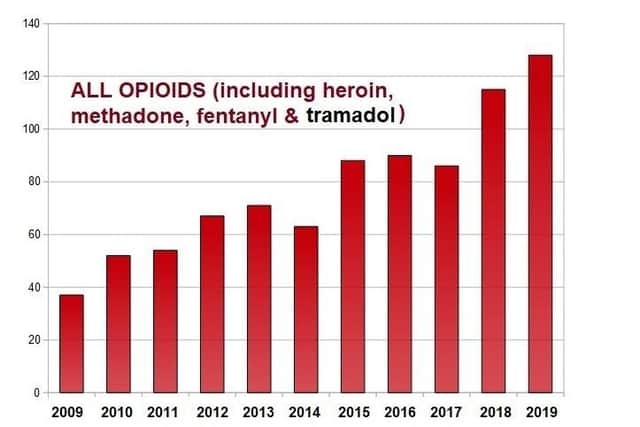

As to what can be done, Mr McMichael (a former leading member of the now-extinct Ulster Democratic Party) said: “Law enforcement is not going to help people who already have an addiction, because people who go into prison find themselves more vulnerable and sometimes [with] better access to drugs – and come out with problems that are more severe than when they went in.
“For people who have addictions, the best way to support them is to encourage them into treatment.”
Meanwhile he believes health staff may be ”over-prescribing” drugs like diazepam, leading to surplus doses flooding the drugs market in addition to all the banned substances like coke and heroin.
HARD FACTS:
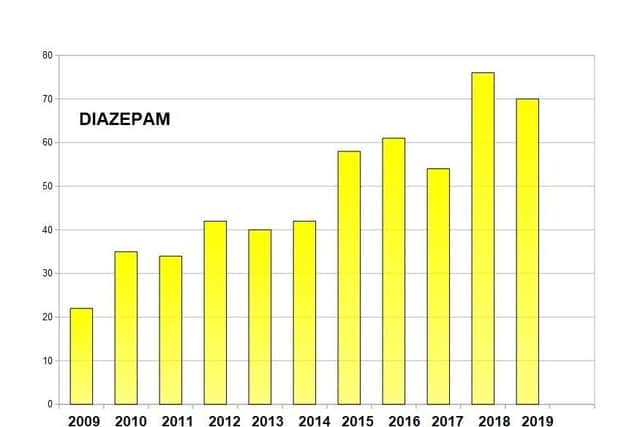

Advertisement
Hide AdAdvertisement
Hide AdThe following data all comes from the NI Statistics and Research Agency, and covers 2009 to 2019.
During that whole decade combined there were 1,400 cases where controlled drugs were listed on NI people’s death certificates – and the death rate has surged over the course of that decade.
For example, in the year 2009 there were 84 drug-linked deaths.
But during 2019, there were 191.
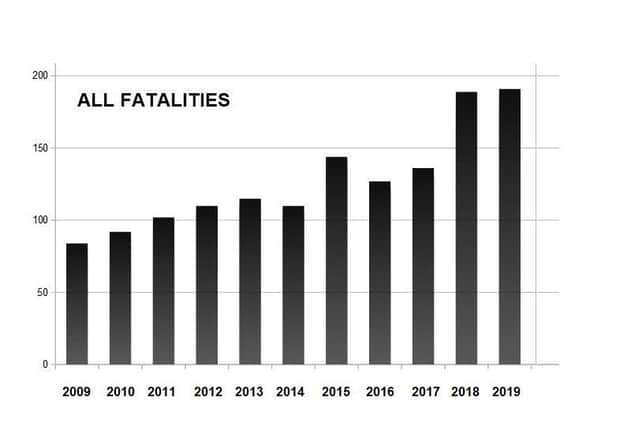

Many death certificates list multiple drugs in users’ systems, not just one.
Advertisement
Hide AdAdvertisement
Hide AdFor example, out of the 2009 fatalities, a total of 221 drugs were mentioned across all the death certificates – 93 of which were legal ones.
And of the 2019 fatalities, a total of 726 drugs were listed on death certificates – 328 of which were legal.
MEN FAR MORE LIKELY TO DIE THAN WOMEN:
Men account for 68% of all drug deaths over the last decade in Northern Ireland.
And while they are not the focus of this report, alcohol death figures are substantial too.
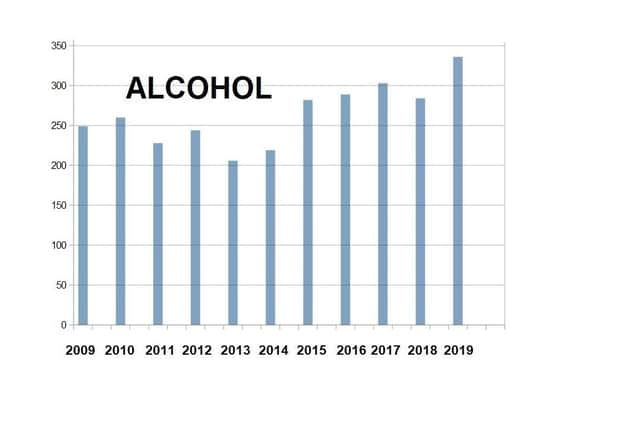

Advertisement
Hide AdAdvertisement
Hide AdFrom 2001 to 2019 there were 4,559 drink-related deaths – a number which has risen over time, but not as sharply as drug deaths.
Again, men account for 68% of all alcohol deaths.
All in all, treatment must be increased said Mr McMichael, and the authorities must work to cut availability of drugs (including counterfeit internet ones, and addressing issues around prescribing).
“Twenty percent of those who died in 2019 had five or more substances in their body listed on their death certificate,” he said.
“Eighty percent had more than one. That’s a dramatic figure. It’s clear we need to deal with this polydrug use.”
Advertisement
Hide AdAdvertisement
Hide AdAnd whilst all this might cost money, “the consequences of not addressing those [problems] is greater”.
Among the practical things that can be done in the short-term is “increasing the availability of the use of naloxone by responders and front line services, as this can be used to help reverse an opioid overdose”.
He added that the ambulance service carry naloxone, and addictions services and some community-based outreach services would have it.
“I don’t think the fire service does though”, he said. “The PSNI are currently doing a pilot in Belfast with some of its officers carrying nasal naloxone.”
SOBERING NUMBERS:
Advertisement
Hide AdAdvertisement
Hide AdHere is a very short breakdown of just how extreme the leap in fatalities has been:
l> All opioid deaths 2009: 37
l> All opioid deaths 2019: 128
l> Cocaine deaths 2009: 4
l> Cocaine deaths 2019: 37
l> Benzo deaths 2009: 28
l> Benzo deaths 2019: 102
l> Gaba deaths 2009: 0
l> Gaba deaths 2019: 92
l> Opioid deaths include heroin as well as legal drugs like methadone, tramadol, and codeine.
l> Benzos (properly benzodiazepines) are calming drugs, inc. diazepam and temazepam.
l> Gabapentinoids are a class of painkiller / epilepsy drugs
More from this reporter:
Advertisement
Hide AdAdvertisement
Hide AdClick here: WATCH: Colum Eastwood says soldiers were sent into Londonderry to murder marchers on Bloody Sunday
Click here: VIDEO: John Traynor named as workman killed after dumper truck believed to have slid on rural hill
A message from the Editor:
Thank you for reading this story on our website. While I have your attention, I also have an important request to make of you.
With the coronavirus lockdowns having had a major impact on many of our advertisers — and consequently the revenue we receive — we are more reliant than ever on you taking out a digital subscription.
Advertisement
Hide AdAdvertisement
Hide AdSubscribe to newsletter.co.uk and enjoy unlimited access to the best Northern Ireland and UK news and information online and on our app. With a digital subscription, you can read more than 5 articles, see fewer ads, enjoy faster load times, and get access to exclusive newsletters and content.
Visit
https://www.newsletter.co.uk/subscriptionsnow to sign up.
Our journalism costs money and we rely on advertising, print and digital revenues to help to support them. By supporting us, we are able to support you in providing trusted, fact-checked content for this website.
Ben Lowry, Editor